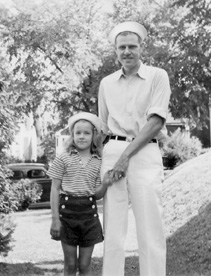 Dear Old Dad
Dear Old Dad Dear Old Dad
Dear Old Dad
For Father's Day 1998, NBT readers share those most formative of experiences, their relationship with their dads. Represented are six fathers and 11 writers, one tribute having been composed by a family.
Francis W. Brown: His legacy was love for Chesapeake Bay
by Lois Brown Oakes
Francis Brown, at right and below, taught his daughter, Lois ---with him here --the joys of the Bay and its many bounties.
Father's Day 1998 will be the first one in my lifetime
that Dad, Francis W. Brown, will not be with us. Dad passed away last August,
just five weeks short of his 95th birthday after a long life of loving,
doing for and worrying about his family. In his later years, when his infirmities
kept him from participating in life as he would have liked, he kept track
of the members of our large 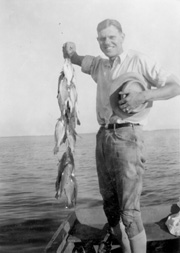 extended
family by phone and mail.
extended
family by phone and mail.
He left many legacies to each of us.
One of the many legacies he left me was his love for Chesapeake Bay. He became enamored with the Bay as a teenager before World War I when his parents rented a cottage at North Beach for a month each summer. During the '20s, he and a nephew went camping at Solomons Island. He introduced me to the Bay in 1936 when he took me for day trips to Breezy Point Beach.
I had him all to myself that summer as my mother stayed home with my baby brother. We swam and hunted for sharks' teeth, and sometimes we rented a flat-bottomed row boat and rowed out to the black buoy to fish for spot and hardhead. That same summer, he took me for a weekend to the pony roundup in Chincoteague.
During World War II, our family rented a cottage at Breezy Point where we spent two wonderful weeks each summer enjoying the delights of the Bay. When finances allowed, Dad bought a cottage across the inlet from Breezy Point at Neeld Estate, where my brother and I finished growing up in the "land of pleasant living."
Dad and Mother continued to use the cottage on weekends and the month of September until my mother's ill health forced them to stop. My husband and I visited regularly until our growing family outgrew the cottage and we were lucky enough to buy one of our own nearby. We developed a sort of compound where we ran back and forth between houses as we all enjoyed each other's company and learned from Dad's knowledge of the Bay.
Dad could never bring himself to return after my mother's death; however, he derived pleasure from knowing that his family was enjoying the Bay as he had. Though he is gone, the cottage remains the focus of family summer activities and reunions by the Bay.
Our last reunion was a bittersweet gathering of the clan at the Bay, where he joined my mother for eternity in the place they both loved best.
-Lois Brown Oakes, originally of Washington, D.C., lives in Howard County and has summered on Chesapeake Bay for over half a century. She and her husband, J. Barry Oakes, are the parents of five of Francis Brown's eight grandchildren.
George Keller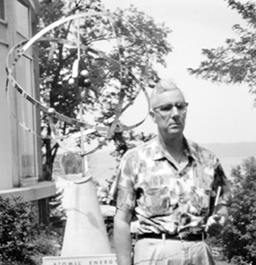 : Blindness
was no handicap
: Blindness
was no handicap
by Virginia Keller Beauchamp
George Keller , at right, visited Calvert Cliffs Nuclear Power Plant in the early 1960s to work his magic, explaining the capabilities of visually challenged citizens. See the cane neatly folded in his left hand.
Let me introduce you to George William Keller, my dad. A different father by most standards because he was blind (my mom, too), that in no way diminished their lives, mine or the life of my younger brother, Steve. In fact, we were truly blessed and enriched.
In 1945, shortly after World War II ended, Dad moved from Columbus, Ohio, to Baltimore with my mother, Virginia, and a child as yet unborn - myself. He came here to establish a program of services for the blind for the Maryland Department of Rehabilitation. At that time, most employers felt that blind people were only capable of making cane chairs and brooms. My father knew that visually challenged individuals could do more; he could, though totally blind since age 12.
He would travel to post-war industry sites, like Martin-Marietta, with no seeing-eye dog, just a cane, transferring on several buses. Arriving always on time, he would enter the plant, ask for instructions on operating a piece of machinery, then ask them to step back as he, amazingly, with no eyes, operated that piece of equipment. He proved all over Baltimore, the state of Maryland and throughout the United States that blind people with proper training and instruction can perform challenging and necessary work.
Imagine, if you will, having all your course work for a master's degree from Loyola University read to you by friends and your secretary; then retaining it in your head and graduating with honors. Dad used to tell me that it would be more handicapping not to hear me than not to see. I truly think he knew exactly what I looked like in his mind.
To say the least, I was tremendously proud of the accomplishment of these two people who lived their whole lives not handicapped but challenged in different ways.
My father was the apple of my eye, and I was the eyes he needed. When I was 16, he purchased a car for our family, and I had the great pleasure of taking him all over the state, including many trips to the General Assembly in Annapolis. Today, as vice president of the second largest small business trade association in the United States, I spend much of the day lobbying and advocating on behalf of the smallest of small businesses. From father to daughter passed the love of politics and speaking out for those whose views need to be heard.
My dad taught me respect for all individuals no matter what their capacity, race, creed or individual circumstance. He did all that not by telling me but by living and walking that path. To me, that is the highest standard a Dad could bequeath to his daughter and to his son. I miss him greatly; God called him into his personal service in 1986, but his legacy lives on.
-Virginia Keller Beauchamp, of Chesapeake Beach, lobbies for the National Association for the Self-Employed.
Dent Lynch: He Stuck It Out
by Janice Lynch Schuster
Dent Lynch -- Duck to his grandchildren -- a giver of life and love to his family.
According to his own report, the first time my teenage father saw me, he fled. It was 1962, he was 19, and his first child was jaundiced, covered in dark hair and had 12 toes. He later returned to spirit my mother home, only to receive a call from OB/Gyn telling him to bring her back.
His abandonment did not last long, even though he and my mother were
so young and naive. Within three years, they woul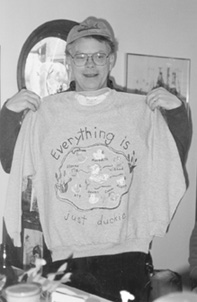 d have two more daughters, and the much-awaited son would not
come for another four. In those seven years, he completed college and law
school, worked nights at the National Security Agency, studied when he could
and played with us when there was time. I remember he liked to hide blocks
by pretending to swallow them. My sisters and I squealed in frenzy as his
Adam's apple bobbed up and down.
d have two more daughters, and the much-awaited son would not
come for another four. In those seven years, he completed college and law
school, worked nights at the National Security Agency, studied when he could
and played with us when there was time. I remember he liked to hide blocks
by pretending to swallow them. My sisters and I squealed in frenzy as his
Adam's apple bobbed up and down.
What did I learn from my father? He is an intelligent man with a quick sense of humor, a sports fanatic who has attended Redskins games for more than three decades, an attorney in Upper Marlboro and a great fan of the Bay and Cape Anne, where he and my mother now live. He taught me how to play gin rummy, catch a baseball, and make a fist so my thumb wouldn't get broken.
Now that I am a mother, I know even better what a thing it is for my teenage father to have stuck it out, to have come back to that hospital to take me home. He and my mother have been married for 36 years, weathering the inevitable storms of marriage, coaxing four children through college, graduate school and law school.
When I told someone how my father liked to pack us up in our VW bus and drive us across the country, he remarked what an act of love that must have been. Through that act, my siblings and I made it to the Grand Canyon, Yellowstone and a hundred other wonderful sites.
My father shared his sense of humor. His own love of practical jokes and silliness, the black humor of the Irish, made it easier for us to survive our own low points and to laugh at ourselves more often than not.
I cannot recall the last time I told my father I loved him; it's just not something my family does easily. My children, though, who call him Duck, tell him often that they do, and I think their love is a proxy for mine. And because he is the generation of fathers who never learned to change a diaper or sing a lullaby, he would feel uncomfortable to hear of all the good things he gave me, first by giving me life, then by giving me love.
-Janice Lynch Schuster lives in Riva with her husband, five children and a dog. A professional writer, she works with Americans for Better Care of the Dying at George Washington University. Her book, A Handbook for Mortals, will be published in January by Oxford University Press.
Stuart R. Coon: He taught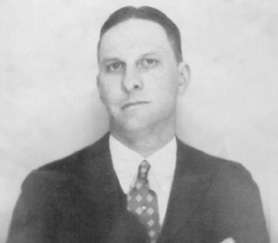 industry and imagination by example
industry and imagination by example
by Edith C. Ralon
Stuart Coon passed his industriousness and his work ethic on to his family, at right.
My early memories of my father, Stuart R. Coon, were when he would be home on weekends. To make a living following the Great Depression - after he lost his manager's position with Woolworth's Five & Ten-Cent Store - he taught himself fountain pen repairing while working in a stationery store. Later, he trained with the manufacturers: Schaefer, Parker and Waterman.
He went on his own to do independent work. This meant that he would travel to find the work. On Monday morning, he would leave for Richmond for a week and come home Friday night - if he could catch a ride hitchhiking. He would not spend the little money he earned for bus or train fare to Fredericksburg, Va., where we lived. In those days, truckers would pick up hitchhikers.
The next week might be Washington, D.C. He would stay in an old hotel that week and send Mother a money order to meet our expenses.
Before he went to a town, my mother would mail postcards to various businesses or government offices, advising them that Dad would be there on a certain date. These businesses would give him an area to work, and the employees would bring their personal pens to him. Most employees had their own pens though their companies supplied them with dip pens. This was long before the ball-point pens that Dad called junk.
Dad replaced the rubber sacks that stored the ink and the other parts, including the gold points and levers that would break. He saved the broken gold points to sell for old gold.
Later, until his retirement in 1970, he worked in and managed a fountain
pen shop in Washington just a few blocks from the White House. That business
supplied the pens the presidents used when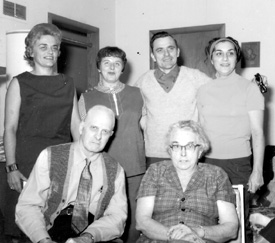 signing
into law the many bills that came from Congress.
signing
into law the many bills that came from Congress.
At home there were four children, and when we needed shoes, he would have Mom outline our feet on a brown paper bag and cut out the shape. When he had opportunity to go by a shoe repair shop, he would fit the outline to the unclaimed repaired shoes and, for the repair price, these were our new shoes.
When I was 11, he came home with a pair of women's brown-and-white wing-tip golf shoes, cleats removed. In school the next day, I was teased because the kids said I was wearing my father's shoes. I cried when I told my father and mother about it, and it hurt him. Dad walked with me two miles to the J.C. Penney's in our town and purchased a pair of brown oxfords with crepe soles. Those were the first pair of new shoes I can remember.
He would also repair our shoes with replacement soles and heels that were available in the dime stores. Shoes were a necessity, not for style or to keep up with the other kids as it is today. Maybe that is why I now buy so many shoes.
When people were looking for help from others to pull them through the tight times, my father was industrious and imaginative enough to find ways to support his family and keep us clothed. I look upon those memories as growing experiences and feel my brothers and I benefited from his work ethic. He did not talk much, but we learned from his example.
-Edith C. Ralon, of Lusby, is the owner of Ralon's Hallmark Shop in Prince Frederick.
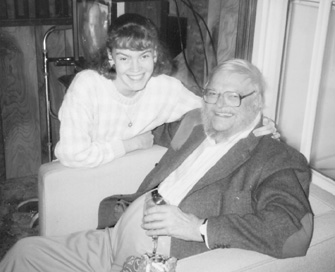 G. Howard Gillelan: He was a character,
a sportsman and our teacher
G. Howard Gillelan: He was a character,
a sportsman and our teacher
by Bess, Hannah, Ian, Josh Gillelan and Harriet Mills
G. Howard Gillelan, below as Scottish as haggis for dinner, and at right with granddaughter Hannah.
I remember sitting on a tall stool in Lexington Market, sharing his oysters. Then at home when he would shuck them, he'd often find a little crab inside and make us all squirm by putting it on your tongue for all to see and then eating it.
This was certainly not the only animal tale. Lots of ducks and geese came home to hang in the outdoor closet on the back porch. There were deer on the front porch and stuffed boar and Catalina goat and pheasant on the wall.
I remember going fly fishing with him in Baltimore County. We came home with beautiful rainbow trout wrapped in newspaper. Then I participated in the ritual of scaling and gutting the fish, the best part checking out the gut contents to see what it was eating.
Even now, every spring the arrival of Orvis catalogues gets Dad's juices running, and I'm directed to retrieve the tackle box and put it out on the dining room table so he can see what he has and what he might need this spring.
-Bess
My most fond and frequent memory: I think we were up on the mountain
by Friends Creek, and I was young. We were walking along the road and he
taught me that I should walk in the opposite direction as the cars, so that
they could see me. Every time I walk along the road or drive by someone
walking along the road, I think of walking along the road, holding hands
and looking up at my Pop-Pop as he explained how not to get run over. Such
a qui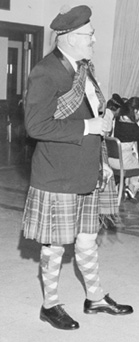 et little
scene has imprinted itself very firmly in my head and heart, bringing him
near even when I'm far away.
et little
scene has imprinted itself very firmly in my head and heart, bringing him
near even when I'm far away.
-Hannah
Our father has always been what he himself would refer to as a character. How many families would have moose, boar, pheasant or haggis as dinner fare? One morning before school, Dad asked me if I minded getting in the canoe and retrieving a goose he'd shot on the creek. At my wedding rehearsal, he gave me a stuffed rabbit to use as my prop bouquet to walk down the aisle.
-Harriet
I remember my first lesson and the first fish: how to cast and retrieve with a spinning rod. I was about five, and it was at the farm pond. Dad showed me how to catch the line with my index finger and flip the bail. Then get the release timed right while casting with the wrist and forearm. After some fumbling with the timing of the release, I caught a nice largemouth. There was a fence around the pond, and I still remember how excited I was climbing over the gate while trying to hold onto the rod with one hand and the end of the line holding up the bass in the other. After getting over the gate, I ran all the way to the house hollering, "I caught a fish!" over and over.
I remember many times out in Eastern Bay, with Dad in a 12-foot skiff about a mile offshore at our spot spot. We'd catch a dozen or more big spot every time on double-bottom rigs with bloodworms. Sometimes we'd get two fish on at the same time.
Often, ferocious squalls would boil up out of the northwest, and as they approached, I'd ask Dad every minute or so, "Don't you think we should go now? The storm's almost here." Just as the first raindrops started to fall on us he'd say, "Okay, let's pull in our lines, and you get the anchor." My rig was already at the rod tip, and I'd have the anchor up before the motor was started. We'd beat the storm to shore and make it inside the house before the rain started. Twenty minutes later, and the sun was back out. Sometimes we'd go right back out to the spot spot and catch some more.
Most of all, I remember Dad's patience in teaching me about tackle, technique, fish behavior, habitat and the environment - and how many fish he must have missed while taking the time to make sure I understood.
-Ian
Youthful experiences laid the foundation for much of my enjoyment of life and my values since. I can feel the touch and hear the sounds and smell the smells of riding along in the front seat of a series of cars, holding Dad's beer (and enjoying a swig or two) on the way to a farm pond, or Friends Creek, or the Westminster Community Pond, or Thurmont to meet up with the Brotherhood of the Junglecock or to Western Run to fish or go crow or groundhog hunting. I can smell the woods at the old Baltimore Bowmen field archery course.
Not everything of such lasting memory was outdoors. At least as central was the experience and absorption of respect for education, for learning, for the intellect and the imperative to do the right thing. The genesis of Eastern Bowhunter [now Peterson's Bowhunting] and its subsequent incarnations showed me that a dream can be actualized by hard work, the guts to do what you haven't a clue how to do and the dedication to whatever effort is necessary to the achievement of excellence.
Whenever I accompanied Dad in the highly varied adult worlds of his writing and outdoor pursuits, I saw reflected in others' eyes a person respected for his knowledge and experience, for contributing and leading and for putting his effort where his mouth was. Maybe, as they used to say in the Junglecock, "a man never stands so tall as when he stoops to help a child."
-Josh
-Bess Gillelan heads NOAA's Chesapeake Bay Office in Annapolis. She and her brothers, sister and niece wrote these remembrances for their father (and grandfather at his 80th birthday. Outdoor writer and editor G. Howard Gillelan - who was best known for his column in Outdoor Life magazine - died this February, a few weeks after his 81st birthday.
Roy S. Bridges: His hands were always my guide
by Eleanor E. Lyba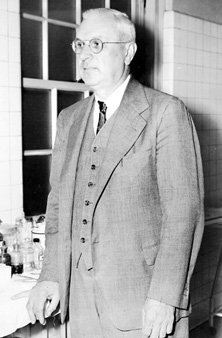
Roy Bridges' hands provided love, guidance and an understanding of the world.
I was Daddy's Girl as I clasped his hand. My own, like his, large-knuckled and broad of span. My father's hands were large and square. When I was troubled, they were always there. As an infant, they steadied me to walk. Guiding me on when I tended to balk. Those hands were a source of comfort to me. They held so much love as they caressed tenderly.
Oh, they'd surely spank if I were overly bad, Yet quick to hold me close if I were sad. Those hands could open a wondrous book As he'd read to me by a babbling brook.
They soothed my brow when I was sick. They'd hold a watch so I could hear it tick. They pointed out so many things The birds. The trees. The butterfly wings.
They fashioned a whistle from a weed. They filled a child's urgent need. They led to first day at school. They taught me about the Golden Rule.
They took me to the circus, brought me glee. Bathed my fevered brow, my skinned knee. They put me on the train when we had to part. They waved bravely over a broken heart.
They gathered me close when we met again, And lifted me up in glad refrain. They wrote me letters as I grew older, Encouraged me to be a "brave little soldier."
They drove the car on little spins. They patted our heads or cupped our chins. They taught me to fish and ride the boat. Supported me firmly as I tried to float.
Many times they left money in my hand, Under the pillow or on the night stand. They lent me support when I needed it most. Held my coffee cup, fixed my toast.
The strength that flowed from them to me, Spread a warm glow for all eternity. Then those hands began to grow old, Wrinkled and thin, trembly and cold.
I looked at those dear hands, folded and stiff, As my father lay there after he was ill. "Passed away. I'm sorry," the doctor said. But I knew for me he'd never be dead.
Those hands will ever be my consolation. Leading, loving, beckoning an inspiration. He left behind him a better world. Oh, I'll ever be proud to say I was Daddy's Girl.
- Eleanor Lyba, of Huntingtown, is retired from Kiplinger Washington Editor and volunteers at Calvert Memorial Hospital. She wrote this poem from the flood of memories unleashed at her father's death.
The winner of NBT's Father's Day write-in will be announced next week and will receive a free "gentleman's package" or a "day of luxury" from Alexander's of Annapolis Salon & Day Spa.
| Back to Archives |
VolumeVI Number 24
June 18-24, 1998
New Bay Times
| Homepage |